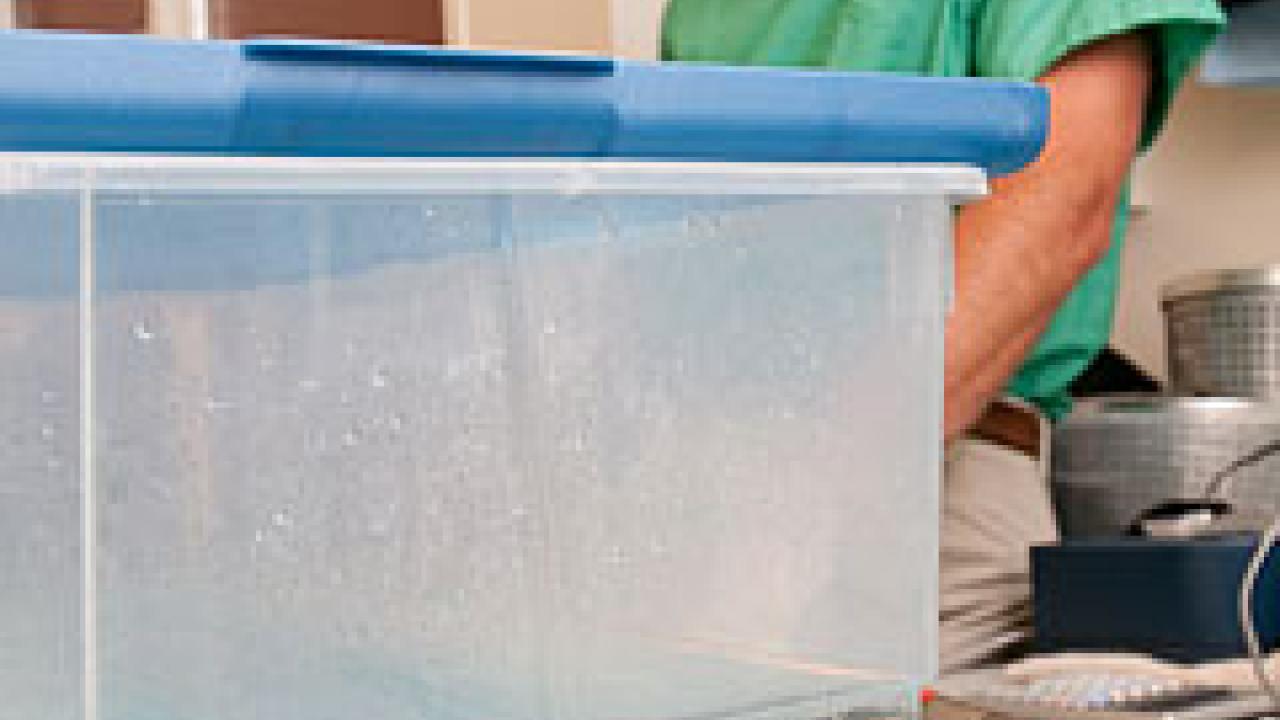If a combined sequel of the films “Doctor Dolittle” and “Finding Nemo” is ever made, Hollywood will undoubtedly come looking for Scott Weber.
A veterinarian trained in the health needs of fish and other aquatic species, Weber leads the new Aquatic Animal Health team at UC Davis’ William R. Pritchard Veterinary Medical Teaching Hospital. The team, which includes exotic-animal veterinarians and a technical crew, is part of the hospital’s Companion Avian and Exotic Pet Service.
Weber, who is a UC Davis alumnus, returned here after practicing seven years as the head veterinarian at the New England Aquarium in Boston. He is well versed in treating fish, amphibians, birds, marine mammals, reptiles and aquatic invertebrates that live in fresh, salt or brackish water. Sometimes Weber’s patients are brought to UC Davis’ veterinary hospital but usually he and colleagues visit them at aquaculture farms, retail fish operations and even backyard ponds.
“Many of our fish cases are local but because veterinarians who specialize in fish health are fairly uncommon, some patients have come from the Eastern United States, Hawaii and even Japan,” Weber said. “And our clients also span a broad spectrum, including home aquarium and koi pond owners, aquaculture farm operators, retail and wholesale dealers, as well as personnel from laboratories, public zoos and aquariums, and even state or federal agencies. “
What can a fish doc do to help prevent disease or heal an ailing fish? Surprisingly, Weber and the Aquatic Animal Health team are able to offer a wide range of services including water testing, physical examinations, parasitology, surgery, endoscopy, skin and scale scrapings, laboratory cultures and viral diagnostic tests. They also provide imaging procedures such as X-rays, ultrasound, and CT and MRI scans. And when necessary, post-mortem exams, called necropsies, can be performed.
The team’s services are built on the long-standing experience of the veterinary school's fish health group, which is responsible for discoveries about koi, sport fish and wild fish health, as well as development of new testing methods to screen for and help prevent fish diseases, such as koi herpes virus.
More information about the veterinary hospital’s services for fish and other aquatic species is available online at: http://www.vetmed.ucdavis.edu/vmth/small_animal/cape/aquatic.cfm.
Media Resources
Pat Bailey, Research news (emphasis: agricultural and nutritional sciences, and veterinary medicine), 530-219-9640, pjbailey@ucdavis.edu
Scott Weber, Veterinary Medical Teaching Hospital, (530) 754-5218, epweber@ucdavis.edu
Lynn Narlesky, Veterinary Medicine dean's office, (530) 752-5257, lnarlesky@ucdavias.edu
Penny Farnham, Veterinary Medical Teaching Hospital, (530) 752-1867, pcfarnham@ucdavis.edu
